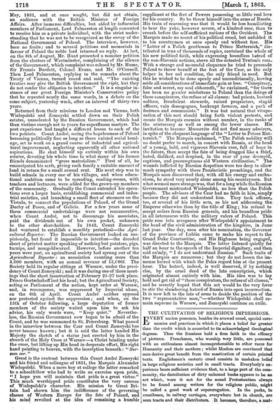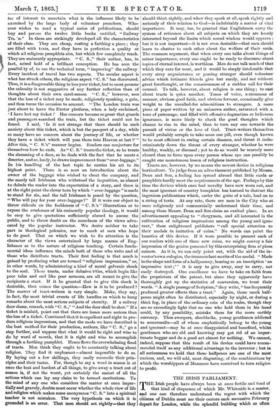THE CULTIVATION OF RELIGIOUS IMPRESSIONS.
EVERY nation possesses, besides its avowed creed, special cere- monies and practices in which it places a belief far greater than the credit which is accorded to its acknowledged theological dogmas. Thus the Russians hold a firm faith in the efficacy of pictures. Frenchmen, who worship very little, are possessed with an enthusiasm almost incomprehensible to other races for Humanity and their mothers ; whilst Moslem are convinced that men derive great benefit from the mastication of certain printed texts. Englishmen's esoteric creed consists in unshaken belief in large religious societies and in small tracts. Everybody's ex- perience bears sufficient evidence that, to a large part of the com- munity, the distribution of dirty unbound books appears to be an act which, were it not for the sound Protestantism always to be found among writers for the religious public, might be called a good work of supererogation. In the parks, in omnibuses, in railway carriages, everywhere but in church, are seen tracts and their distributors. It becomes, therefore, a mat-
ter of interest to ascertain what is the influence likely to be exercised by the large body of volunteer preachers. Who- ever wishes to read a typical series of publications, should buy and peruse the twelve little books entitled, "Railway Ti•s. Is." In them are strikingly developed all the characteristics of their class. They are cheap, costing a farthing a piece ; they are filled with texts, and they have in perfection a quality at which all religious pamphlets aim, but which few completely reach. They are eminently appropriate. " C. S.," their author, has, in fact, seized hold of a brilliant conception. He has seen the possibility of, to use the technical term, " improving" the railway. Every incident of travel has two aspects. The secular aspect is what has struck others, the religious aspect "C. S." has discovered. Thus, it is a disagreeable thing to lose your ticket, but to most persons the calamity is not suggestive of any further reflection than of thoughts about their own carelessness. " C. S.," however, sees that the loss of a ticket may be made, religiously speaking, a gain, and thus turns the occasion to account. " The London train was just about to leave the Exeter platform, when a lady exclaimed,
should think rightly, and when they speak at all, speak rightly and seriously of their relation to God—is indubitably a matter of vital importance. It may, too, be granted that Englishmen carry the system of reticence about all subjects on which they are keenly interested beyond the limits which sound wisdom would approve ; but it is not important—it is not even desirable—that men should learn to chatter to each other about the welfare of their souls. The common argument, that when every one talks about things of minor importance, every one ought to be ready to discourse about topics of eternal interest, is worthless. Men do not talk much of that• which they care for most, and it would be simply intolerable that every stray acquaintance or passing stranger should volunteer• advice which intimate friends give but rarely, and not without great forethought, or the consciousness of a sudden call for their counsel. To talk, however, about religion is one thing ; to cast about tracts is quite another. Tones of voice, seriousness of manner, obvious good faith, and obvious fervour, occasionally give weight to the uncalled-for admonitions to strangers. A mere- piece of paper written by an unknown author, saturated with a tone of patronage, and filled with offensive dogmatism or ludicrous ignorance, is more likely to check the good thoughts which chance to rise in the mind, than to turn any one towards the pursuit of virtue or the love of God. Tract-writers themselves would probably scruple to take some one pill, even though known to be most efficient in curing certain diseases, and thrust it indis- criminately down the throat of every stranger, whether he were healthy, weakly, or diseased ; yet to do so would be scarcely more absurd than to force upon every person whose eye can possibly be caught one monotonous lesson of religious instruction.
Tracts are, however, by no means the newest device in religious, horticulture. To judge from an advertisement published by Messrs.. Dean and Son, a feeling has spread abroad that little cards or pamphlets hardly meet the requirements of the age. Perhaps by this time the devices which once had novelty have now worn out, and the most ignorant of country bumpkins has learned to distrust the ingenious publications which, under the guise of a tale, lead on to a string of texts. At any rate, there are men in the City who at once religiously and commercially understand their time, and among these Messrs. Dean and Son claim an exalted place. In an advertisement appealing to " clergymen, and all interested in the cultivation of religious impressions among the young and ignor. rant," these enlightened publishers " call special attention to their medals in imitation of coins." No words can paint the beauties of this device. If it were possible to present each of our readers with one of these new coins, we might convey a fair impression of the genius possessed by this enterprising firm of pious coiners. As it is, we can only point out, with the aid of the in- ventor's own eulogies, the transcendent merits of the medal. " Made in the shape and form of a halfpenny, bearing as an inscription' an impressive text ;" it is easy to give away, easy to carry, not easily destroyed. One excellence we have to take on faith from the proprietors of the patent, but since they apparently have thoroughly got up the statistics of conversion, we trust their words. " A single passage of Scripture," they write, " has frequently produced greater effects than a tract." Again, these mock half- pence might often be distributed, especially by night, or during a thick fog, in place of the ordinary coin of the realm, though they are so exceedingly light that no one who held them in his hand could, by any possibility, mistake them for the more earthly currency. Thus sweepers, shoeblacks, young gentlemen addicted to somersaults—all of whom emphatically belong to the young and ignorant—may be at once disappointed and benefited, whilst gentlemen who are old and knowing may get rid of an impor- tunate beggar and do a good act almost for nothing. We cannot, indeed, suppose that this result of his device could have recom- mended itself as any additional advantage to the inventor ; but in all seriousness we hold that these halfpence are one of the most curious, and, we will add, most disgusting, of the combinations by which the worshippers of Mammon have contrived to turn religion to profit.



























































 Previous page
Previous page